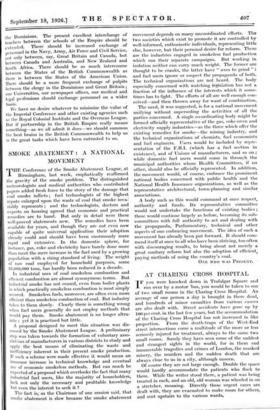SMOKE ABATEMENT : A NATIONAL" MOVEMENT T HE Conference of the
Smoke Abatement League, at Birmingham, last week, emphatically reaffirmed the gravity of the smoke problem. The distinguished meteorologists and medical authorities who contributed papers added fresh force to the story of the damage that coal smoke inflicts ; fuel technologists of the highest repute enlarged upon the waste of coal that smoke invi: riably represents ; and the technologists, doctors and experts on housing agreed that economic and practical remedies are. to hand. But only in detail were these well-proved statements new. The remedies have been available for years, and though they are not even now capable of quite universal application their adoption already could and should have been enormously more rapid and extensive. In the domestic sphere, for instance, gas, coke and electricity have barely done more than meet the mere increase in the fuel used by a growing population with a rising standard of living. The weight of raw coal employed for household purposes, some 35,000,000 tons, has hardly been reduced in a decade.
In industrial uses of coal smokeless combustion and efficient combustion are almost synonymous terms. But industrial smoke has not ceased, even from boiler plants in which practically smokeless combustion is most simply secured. Smokeless fuels, moreover, are often even more efficient than smokeless combustion of coal. But industry takes to them slowly. Clearly there is something wrong when fuel users generally do not employ methods that would pay them. Smoke abatement is no longer altru- istic ; yet it is practised but little.
A propoSal 'designed to meet this situation was dis- cussed by the Smoke Abatement League. A preliminary step was taken towards the formation of voluntary asso- ciations of manufacturers in various districts to study and apply • the - best means of eliminating the waste and inefficiency inherent in their present smoke production. If such a' scheme were made effective it would mean an immense in-crease in technical knowledge and eventual use of economic smokeless methods. But can much be expected of a proposal which overlooks the fact that many industrial fuel users, like the majority of householders, lack not only the necessary and profitable knowledge but even the interest to seek it ?
The fact is, as the Chairman of one session said, that smoke abatement is slow because the smoke abatement movement depends on many uncoordinated efforts. The two societies which exist to promote it are controlled by well-informed, enthusiastic individuals, representing little else, however, but their personal desire for reform. There are the industries engaged in smokeless fuel production which run their separate campaigns. But working in isolation neither can carry much weight. The former are thought to be cranks, the latter have " axes to grind " ; and fuel users ignore or suspect the propaganda of both.
The technical organizations are not heard. The body especially concerned with watching legislation has not a -fraction of the influence of the interests which it some- times has to fight. The efforts of all are well enough con- ceived—and then thrown away for want of combination. The need, it was suggested, is for a national movement unifying without superseding the activities of all the parties concerned. A single co-ordinating body might be formed officially representative of the gas, coke-oven and electricity supply industries—as the three which offer the existing remedies for smoke—the mining industry, and the technical organizations of chemists, fuel economists and fuel engineers. Users would be included by repre- sentation of the F.B.I. (which has a fuel section in existence), and of Unions of manufacturers, and so on ; while domestic fuel users would come in through the municipal authorities whose Health Committees, if no other, should also be officially represented. In addition, the movement would, of course, embrace the prominent national bodies concerned with public health and the National Health Insurance organizations, as well as the representative architectural, town-planning and similar associations.
A body such as this would command at once respect, authority and funds. Its representative committee would not undertake the functions of existing bodies ; these would continue largely as before, becoming its sub- committees with full authority to act and dealing with the propaganda, Parliamentary, technical and other aspects of one embracing movement. The idea of such a movement has already been put forward. It should com- mend itself at once to all who have been striving, too often with discouraging results, to bring about not merely a great sanitary reform but also the adoption of efficient, paying methods -of using the country's coal.
ONE WHO WAS PRESENT. •






























































 Previous page
Previous page